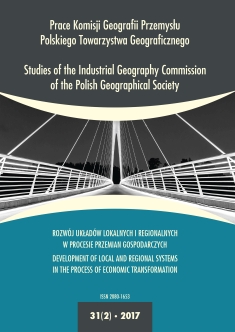Poland’s Voivodeships and Poviats and the Geographies of Knowledge: Addressing Uneven Human Resources
DOI:
https://doi.org/10.24917/20801653.302.13Keywords:
Google hyperlinks, human welfare, knowledge economies, knowledge gapsAbstract
In a postindustrial economic world, information economies are key components in local, regional and national development. These are service economies, built on the production, consumption and dissemination of information, including education, health care, outsourcing, tourism, sustainability and related human welfare services. We explore the geography/knowledge intersections in Poland’s voivodeships and poviats by using the volumes of information or hyperlinks about selected information economies. Google hyperlinks are electronic knowledge data that can be mapped to highlight the areas of most and least information about certain subject categories. While some mapping results are expected, such as Warsaw and Krakow, being prominent, in other regions there are unexpected gaps within eastern, northern and southern Poland, including some places near major metropolitan centers. There is a significant difference between the cities with poviat rights, which stand out in the number of information on items comparing to the poviats that surround them. The majority of poviats in Mazowieckie voivodeship are surprisingly recognized as core areas on the map of knowledge, nevertheless they are considered undeveloped from the economic point of view.
Downloads
Metrics
References
Brunn, S.D., Dodge, M. (2001). Mapping the “worlds” of the world-wide web: (re) structuring global commerce through hyperlinks. American Behavioral Scientist, 44(1), 1717–1739.
Brunn, S.D. (2003). A note on the hyperlinks of major Eurasian Cities. Eurasian Geography and Economics, 44(4), 321–324.
Brunn, S.D. (2011). World cities: Present and future. In J.P. Stoltman (ed.) Geography for the 21st Century. Thousand Oaks, CA: Sage Publications, 301–314.
Brunn, S.D. (2014). Cyberspace knowledge gaps and boundaries in sustainability science: Topics, regions, editorial teams, journals. Sustainability 6, 6576–6603; doi. 10. 3390/su6106576
Brunn, S.D. (2015). Constructing and mapping an EU knowledge base: Worlds of gaps and opportunities. Mitteilungen der Osterreichischen Geographisches Gesellschaft, 157, 51–70.
Brunn, S.D., Devriendt, L., Boulton, A. , Derudder, B., Duan, J., Witlox., F. (2010). Networking European cities in worlds of economic crises and global environmental change. Fennia, 188(2), 37–44.
Brunn, S.D., Devriendt, L., Boulton, A., Derudder, B., Duan, J., Witlox., F. (2016). Assessing the Impacts of the Global Financial Crisis on Major and Minor Cities in South and Southeast Asia: A Hyperlink analysis. In Ashok Dutt et al., Spatial Diversity and Dynamics in Resources and Urban Development. Vol. 2: Urban Development. Dordrecht: Springer Science+Business Media, 135–155.
Brzozowski, T.T. (2013). Wiedza jako podstawowy czynnik rozwoju usług [Knowledge as a Basic Development Factor of Industry and Services]. Prace Komisji Geografii Przemysłu Polskiego Towarzystwa Geograficznego [Studies of the Industrial Geography Commission of the Polish Geographical Society], 21, 390–404.
Devriendt, L., Boulton, A., Brunn, S., Derudder, B., Witlox., F. (2009). Major cities in the information world: Monitoring cyberspace in real-time. GAWC Research Bulletin 308. Online available at: http://www. lboro/ ac/uk/gawc/rb/rb308/html.
Devriendt, L., Boulton, A., Brunn, S., Derudder, B., Witlox., F. (2011). Searching for cyberspace? The position of major cities in the information age. Journal of Urban Technology, 18(1), 73–92.
Google Search Engine (2015). Data collected from 12 to 16 November 2015.
Livingston, D.N. (2010). Landscapes of knowledge. In: P. Meusberger, D.N. Livingston and H. Jons (Eds.). Geographies of Science. Dordrecht: Springer, 3–22.
Olechnicka, A. (2000). Rozwój regionalny w warunkach gospodarki informacyjnej. Studia Regionalne i Lokalne, 4(4), 37–50.
Williams, J.R., Brunn, S.D. (2004). Cybercities in Asia: Measuring globalization using hyperlinks. Asian Geographer, 23(1–2), 121–147.
Zioło, Z., Rachwał, T. (ed.). (2013). Funkcje przemysłu i usług w rozwoju gospodarki opartej na wiedzy [Functions of industry and services in the development of knowledge-based economy]. Prace Komisji Geografii Przemysłu Polskiego Towarzystwa Geograficznego [Studies of the Industrial Geography Commission of the Polish Geographical Society], 21.
Downloads
Published
How to Cite
Issue
Section
License
Articles are published under the terms of the Creative Commons License (CC BY-ND 4.0; Attribution– NoDerivs).

